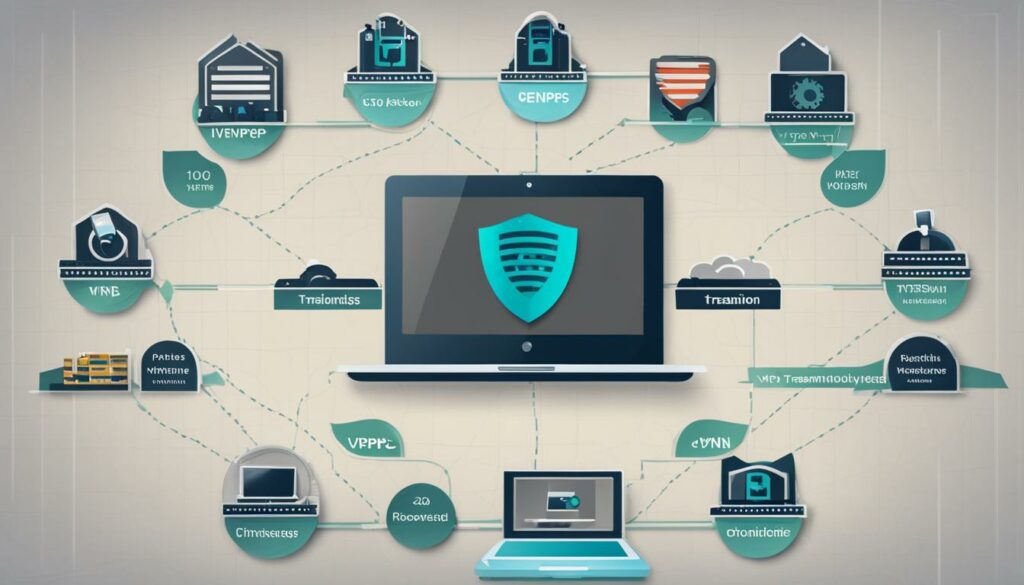A VPN, or Virtual Private Network, is a technology that allows users to establish a secure and private network connection when using public networks. By encrypting internet traffic and masking online identity, VPNs make it difficult for third parties to track activities and steal data.
VPNs work by redirecting internet traffic through a remote server, effectively hiding the user’s IP address and encrypting their data. This ensures that ISPs and other third parties cannot see which websites are visited or what data is transmitted. VPNs provide secure encryption, disguising of user whereabouts, access to regional content, and secure data transfer.
Key Takeaways:
- VPNs allow users to establish a secure and private network connection when using public networks.
- They encrypt internet traffic and mask online identity, making it difficult for third parties to track activities and steal data.
- VPNs redirect internet traffic through a remote server, hiding the user’s IP address and encrypting their data.
- They provide secure encryption, disguising of user whereabouts, access to regional content, and secure data transfer.
- Using a reliable VPN provider and following best practices ensure optimal security and performance.
How Does a VPN Work?
When it comes to understanding how a VPN works, it’s important to start with the basics. A VPN, or Virtual Private Network, creates a secure and encrypted connection between your device and the internet. This connection is established by redirecting your internet traffic through a remote server operated by the VPN provider. This server acts as a middleman, masking your IP address and encrypting your data, making it nearly impossible for anyone to track your online activities.
But how exactly does this process work? When you connect to the internet through a VPN, your data is encrypted and sent through a secure tunnel to the VPN server. The VPN server then becomes the source of your data, making it difficult for ISPs and other third parties to trace back to your original IP address. This encryption process uses complex algorithms that scramble your data, requiring an encryption key to decrypt it. Without this key, it would take an exorbitant amount of time for anyone to decipher your encrypted information.
There are different VPN protocols that determine the level of security and encryption used. For example, PPTP (Point-to-Point Tunneling Protocol) is one of the oldest protocols and offers basic encryption. On the other hand, L2TP/IPSec (Layer 2 Tunneling Protocol/Internet Protocol Security) provides stronger encryption, making it more secure. OpenVPN, an open-source protocol, is widely regarded as one of the most secure options available. By understanding how VPN protocols and encryption work together, you can choose the best VPN service that suits your needs.
VPN Protocols and Encryption
| VPN Protocol | Level of Encryption |
|---|---|
| PPTP (Point-to-Point Tunneling Protocol) | Basic encryption |
| L2TP/IPSec (Layer 2 Tunneling Protocol/Internet Protocol Security) | Strong encryption |
| OpenVPN | Highly secure encryption |
The encryption provided by a VPN ensures that your online activities, such as browsing websites, sending emails, or accessing online services, remain private and secure. It adds an extra layer of protection, especially when using public Wi-Fi networks or accessing sensitive information.
Overall, a VPN works by encrypting your data and routing it through a remote server, making it difficult for anyone to intercept or track your online activities. By understanding how VPN protocols and encryption work, you can make an informed decision about which VPN service to use for your specific needs.
Benefits of a VPN Connection
A VPN connection offers numerous benefits that enhance online privacy, security, and performance. By utilizing a VPN server, users can enjoy the following advantages:
- Enhanced Online Privacy: A VPN encrypts internet traffic, ensuring that personal data and browsing activities remain hidden from prying eyes. This is particularly important when using public Wi-Fi networks, which are notorious for their vulnerability to hackers and data breaches.
- Protection Against External Access: VPNs provide a secure tunnel for data transmission, preventing unauthorized access by cybercriminals and other malicious third parties. This safeguard is crucial, especially when accessing sensitive information or conducting confidential transactions online.
- Disguise User Whereabouts: By connecting to a VPN server, users can mask their IP addresses and appear as if they are browsing from a different location. This not only protects their privacy but also allows them to bypass geo-restrictions and access regionally restricted content.
- Secure Data Transfer: VPNs enable secure data transfer, making them ideal for remote work and accessing company networks. By encrypting data, VPNs ensure that sensitive information remains confidential and protected during transmission.
Overall, a VPN connection offers a comprehensive solution for individuals and businesses seeking to enhance their online security, protect their privacy, and enjoy unrestricted access to the internet.
Table: Comparison of VPN Server Performance
| VPN Provider | Speed | Server Locations | Encryption Protocols |
|---|---|---|---|
| Provider A | Fast | 50+ | PPTP, L2TP/IPSec, OpenVPN |
| Provider B | Medium | 30+ | PPTP, OpenVPN |
| Provider C | Slow | 10+ | L2TP/IPSec, OpenVPN |
“Using a VPN not only safeguards your online privacy but also provides added benefits such as accessing regionally restricted content and securing your data during transmission.” – Cybersecurity Specialist
Why Should You Use a VPN Connection?
Using a VPN connection is crucial for ensuring online security and protecting your personal data. ISPs have the ability to track and log your internet activities, potentially sharing this information with advertisers, governments, or other third parties. This invasion of privacy can be prevented by using a VPN, which encrypts and masks your data, making it difficult for anyone to intercept or decipher. Additionally, public Wi-Fi networks pose a significant risk as hackers can easily access and intercept data transmitted over these networks. A VPN provides an extra layer of security by encrypting your internet traffic, making it safe to use public Wi-Fi without worrying about data breaches.
VPN servers offer various security features to enhance your protection. One important feature is a kill switch, which automatically terminates the internet connection if the VPN connection is interrupted. This prevents your data from being exposed in case of a VPN disconnect. Another security measure is two-factor authentication, which adds an extra layer of login security by requiring a second piece of personal information, such as a unique code sent to your mobile device. This ensures that only authorized users can access the VPN connection. It is recommended to choose a VPN provider that offers these security features and regularly updates their servers to stay ahead of potential vulnerabilities.
Aside from security, VPNs also offer configuration options to optimize your browsing experience. Some VPN services allow you to choose the location of the remote server you connect to, which can give you access to region-specific content that may be blocked in your location. This is especially useful for streaming services or accessing websites that are geographically restricted. Additionally, VPNs can offer faster browsing speeds by bypassing certain internet restrictions or optimizing the traffic flow. If you frequently travel or need to access specific content, configuring your VPN server settings can greatly enhance your online experience.
Table: VPN Server Security Features
| Security Feature | Description |
|---|---|
| Kill Switch | Automatically terminates the internet connection if the VPN connection is interrupted, preventing data leaks. |
| Two-Factor Authentication | Requires an additional piece of personal information, such as a unique code sent to a mobile device, for login security. |
| Regular Server Updates | Ensures that the VPN server is up-to-date with the latest security patches and protects against vulnerabilities. |
In conclusion, using a VPN connection is essential for maintaining online privacy, protecting your personal data, and enhancing your browsing experience. By encrypting your internet traffic and masking your IP address, VPNs provide a secure and anonymous connection, preventing ISPs and hackers from tracking your activities. VPNs also offer various security features such as kill switches and two-factor authentication to further enhance your protection. Additionally, configuring your VPN server settings can optimize your browsing speed and give you access to region-specific content. With the increasing importance of online security, using a VPN is a wise choice for anyone concerned about their privacy and data security.
The History of VPNs
Virtual Private Networks, commonly known as VPNs, have a rich history that dates back to the 1960s, with the primary goal of encrypting internet communication data. As the internet evolved and the TCP/IP protocol was introduced, VPNs became an essential tool for protecting and encrypting internet browsing data.
The concept of VPNs gained momentum in the early 2000s, primarily used by companies to secure their internal networks. However, with the increasing number of security breaches and the growing demand for online privacy, VPNs quickly gained popularity among individual users in the consumer market.
Today, VPN usage has skyrocketed, driven by the need for accessing geo-restricted content and ensuring online security. The number of VPN users worldwide continues to grow as people recognize the importance of protecting their online privacy and safeguarding their personal information from prying eyes.

The history of VPNs showcases their evolution from a security measure utilized by corporations to a widely adopted tool for individuals seeking privacy and online freedom. With the ever-increasing threats to online security, VPNs play a crucial role in ensuring a secure and private internet browsing experience.
How to Surf Securely with a VPN
Surfing the internet securely with a VPN requires a few simple steps to ensure optimal protection. First and foremost, it is crucial to choose a reliable VPN provider and set up the VPN connection properly. Most VPN providers offer user-friendly VPN clients that can be easily installed on desktops, laptops, and mobile devices. These clients allow users to connect to VPN servers with just a few clicks, ensuring a secure and encrypted connection.
Once connected to a VPN server, all internet traffic is routed through the server, protecting the user’s data from prying eyes. The VPN server acts as a secure tunnel between the user and the internet, masking the user’s IP address and encrypting their personal information. This prevents ISPs, hackers, and other third parties from intercepting and tracking online activities.
To maintain a secure VPN connection, regular maintenance is essential. This includes keeping the VPN software up to date, as software updates often include security patches and improvements. It is also important to periodically review and adjust the VPN configuration settings to ensure optimal security and performance. Taking these maintenance steps helps to mitigate any potential vulnerabilities and ensures a smooth and secure VPN experience.
Table: Key Steps for Setting Up and Maintaining a VPN Connection
| Step | Description |
|---|---|
| Choose a reliable VPN provider | Research and select a reputable VPN provider that suits your needs and offers strong encryption and privacy features. |
| Install the VPN client | Download and install the VPN client provided by your chosen VPN provider on your device. Follow the installation instructions. |
| Connect to a VPN server | Launch the VPN client and connect to a VPN server of your choice. This will establish a secure connection between your device and the internet. |
| Maintain regular updates | Keep the VPN software up to date by installing recommended updates and patches. This helps ensure optimal security and performance. |
| Periodically review and adjust settings | Review and adjust the VPN configuration settings as needed to address any security or performance concerns that may arise. |
| Monitor VPN performance | Regularly monitor the performance of your VPN connection to ensure it is stable and providing the desired level of security. |
By following these steps and implementing best practices, users can surf the internet securely and enjoy the benefits of a VPN connection. Whether it’s protecting personal data on public Wi-Fi networks or accessing geo-restricted content, a properly set up and maintained VPN ensures peace of mind and online privacy.
What Kind of VPNs Are There?
A VPN, or Virtual Private Network, can take on different forms depending on the specific needs and use cases. Here are three common types of VPNs:
- SSL VPN: SSL VPN, or Secure Sockets Layer VPN, is a type of VPN that allows remote users to securely access a company’s internal network using a web browser. It uses SSL/TLS protocols to establish a secure connection between the user’s device and the VPN server. SSL VPNs are commonly used in remote work scenarios where employees need to access company resources from outside the office.
- Site-to-Site VPN: Site-to-Site VPN, also known as network-to-network VPN, connects multiple networks together over the internet. It allows different locations of a company, such as branches or data centers, to securely communicate with each other using encrypted tunnels. Site-to-Site VPNs are commonly used by large enterprises to share resources and maintain a secure internal network.
- Client-to-Server VPN: Client-to-Server VPN, also referred to as remote access VPN, enables individual users to connect to a specific VPN server and encrypt their internet traffic. It allows users to establish a secure connection to the internet through a remote server, ensuring their data is protected from interception. Client-to-Server VPNs are commonly used by individuals who want to secure their internet connection and bypass censorship or access geo-restricted content.
Each type of VPN serves a different purpose and offers varying levels of security and functionality. The choice of VPN type depends on the specific requirements and use case, whether it be remote work, interconnecting networks, or securing individual internet connections.

Table: Comparison of VPN Types
| VPN Type | Use Case | Security | Functionality |
|---|---|---|---|
| SSL VPN | Remote work scenarios | High | Secure access to company resources through web browsers |
| Site-to-Site VPN | Connecting multiple networks | High | Secure communication between different locations |
| Client-to-Server VPN | Individual internet security | Medium to High | Securing internet connection, bypassing censorship, accessing restricted content |
Do You Really Need a VPN?
A VPN offers numerous benefits in terms of privacy and security, making it a valuable tool for many internet users. Whether or not you need a VPN depends on your specific needs and circumstances. If you frequently use public Wi-Fi networks or want to access geo-restricted content, a VPN can provide enhanced protection and access. It encrypts your data, making it difficult for hackers and other malicious third parties to intercept. Additionally, a VPN can disguise your true location, allowing you to bypass geographical restrictions and access content that may otherwise be blocked.
One of the key advantages of using a VPN is the increased security it offers. VPNs encrypt your internet traffic, preventing unauthorized access to your personal data. This is especially important when using public Wi-Fi networks, which are often targeted by hackers. By using a VPN, you can protect your sensitive information and ensure that it remains confidential.
Another important benefit of using a VPN is the added layer of privacy it provides. When you connect to the internet through a VPN server, your IP address is masked, making it difficult for others to track your online activities. This can help protect your privacy and prevent targeted advertising based on your browsing habits. By encrypting your data and hiding your IP address, a VPN gives you greater control over your online presence.
In conclusion, while a VPN is not necessary for everyone, it can offer significant benefits in terms of privacy and security. If you value online privacy, want to protect your personal data, and need access to geo-restricted content, a VPN is definitely worth considering. Just remember to choose a reputable VPN provider and follow best practices to maximize its benefits.
Conclusion
VPNs are essential tools for protecting online privacy and securing internet connections. By encrypting data and masking IP addresses, VPNs provide a layer of security that helps prevent unauthorized access and tracking.
VPNs offer numerous benefits, including accessing restricted content, disguising user whereabouts, and enabling secure data transfer. Whether you frequently use public Wi-Fi networks or value online privacy, using a VPN is highly recommended.
However, it is crucial to choose a reliable VPN provider and follow best practices to ensure optimal security and performance. With the increasing importance of online privacy, incorporating a VPN into your online activities is a wise choice for individuals and businesses alike.
FAQ
How does a VPN work?
A VPN works by redirecting internet traffic through a remote server, encrypting the data and hiding the user’s IP address. This ensures that ISPs and other third parties cannot see which websites are visited or what data is transmitted.
What are the benefits of a VPN connection?
A VPN connection offers enhanced online privacy, protection against external access, access to regional content, and secure data transfer.
Why should I use a VPN connection?
Using a VPN connection is essential for maintaining online privacy and security. It protects against data leaks, cybercriminals, and prevents ISPs from tracking and logging user activities.
What is the history of VPNs?
The concept of VPNs dates back to the 1960s, with the development of the internet and TCP/IP protocol leading to the creation of VPNs. They gained popularity in the consumer market due to the increasing demand for online privacy and security.
How can I surf securely with a VPN?
To surf securely with a VPN, users need to connect to a VPN server through a VPN client or a VPN-enabled router. It is important to choose a reliable VPN provider, configure the VPN properly, and regularly update and maintain the VPN server.
What kind of VPNs are there?
There are several types of VPNs, including SSL VPNs, site-to-site VPNs, and client-to-server VPNs. Each type serves different purposes and offers varying levels of security and functionality.
Do I really need a VPN?
Whether or not you need a VPN depends on your specific needs and circumstances. If you frequently use public Wi-Fi networks, want to access geo-restricted content, or value online privacy, a VPN is highly recommended.






